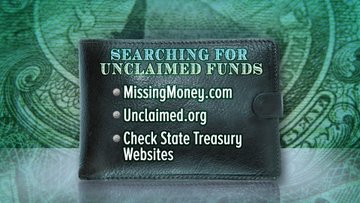Stumbling on a wad of cash sounds like something from a movie. You might be surprised, but many people have unclaimed money waiting for them.
This could include refunds, old bank accounts, forgotten deposit boxes, lost wages, settlements, or insurance policies. Whether you’re living paycheck to paycheck or maximizing ways to boost your savings, locating missing money is a great way to put cash back in your wallet.
Nowadays, you do not have to search your couch for missing coins. The National Association of Unclaimed Property Administrators reports that $3 billion in unclaimed funds is returned to owners each year.
That means that one in every ten people has money waiting for them to claim it.
So, do not wait for the state to invest your missing money. Instead, track down any missing money with your name on it today.
1. Search for unclaimed funds
When you are hunting for unclaimed money, the best place to start is by searching free databases that help people track down missing funds.
- Type your name into MissingMoney.com to search multiple states. If your last name is unusual, it is even easier to see if your name pops up. Keep in mind that not all states are searchable on MissingMoney.com.
- That is why it’s a good idea to head to Unclaimed.org next. According to the National Association of Unclaimed Property Administrators (NAUPA) clearinghouse, this site can give you more information.
- You can also investigate FindMyFunds.com to check if missing money is turned over to state custody in more than 25 states.
- The U. S. Department of Housing and Urban Development (HUD) often has refunds from FHA home loans. If you have had this type of loan in the past, check out HUD.gov to see if you qualify for a refund. In addition, for foreign property owners or those with an overseas bank account, the Bureau of Fiscal Service is a good source.

2. Hunt down previous pension plans
Did you know millions of dollars in pension funds are floating around unclaimed? When companies fold or shut down their benefit plans, the connection between account owners and old accounts is often lost.
If you moved, changed contact information, or the company can’t locate you, your pension money is transferred to the Pension Benefit Guaranty Corporation (PBGC).
A government agency holds retirement income until the rightful owners claim it. The best way to check if you are owed money from a former pension plan is to look for your name on the organization’s unclaimed pension database.
3. Review your old 401(k)s
When many people move from one job to the next, they often do not transfer their retirement plans to the new company. As a result, some people might have opted-in automatically to their company’s retirement plan without knowing it.
It is a common way to lose track of old retirement accounts.
The good news is that you can find old 401(k) accounts and request a benefit pay-out through the PBCG’s Missing Participants Program.
4. Check Your Old Bank Accounts
It is crazy to think that people can forget about the money in the bank, but it’s easier than you think.
For example, if you had an old college account, one that your parents set up for you as a minor, or had funds in a credit union or another type of financial institution that later shut down, you could have missed money due.
According to the Federal Deposit Insurance Corp. (FDIC), there is a list of unclaimed deposits insured at banks that closed.
Use the FDIC’s BankFind tool to track down your old bank accounts or discover if a new institution has opened with information about your unclaimed money.
5. Contact the IRS
The Internal Revenue Service doesn’t just collect taxes. So, if you were supposed to get a refund but didn’t file in a previous year, your refund could be one of the $1.5 billion in unclaimed refunds that the IRS will report in 2022.
The good news is that you have a 3-year grace period to claim the money. Afterward, head to the IRS website to review current or prior-year tax forms if you haven’t yet filed for the year in which you should have a refund.
Do not worry; there aren’t any penalties for submitting a late tax filing if the IRS owes you. Since it is your money, all you need to do is go after it.
6. Dig out forgotten savings bonds
Remember getting savings bonds as a kid? You probably wanted a bike, a skateboard, Barbie, or the latest video game for Christmas or birthdays instead.
Now you might be in for a happy surprise if you hung onto any old savings bonds.
It is a fact that there are billions of dollars in mature government savings bonds that no one has ever cashed. Many people do not know they have them squirreled away in boxes, attics, or storage units.
Once you dig out forgotten savings bonds, submit a Fiscal Service Form 1048 and Claim for Lost, Stolen, or Destroyed United States Savings Bonds if you think you are owed some money.
These practical tips will help track lost money and put cash back in your pocket when you least expect it.


Leave a Reply